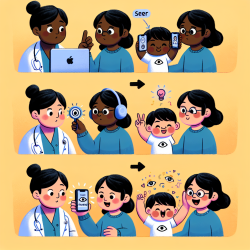For many special education advocacy groups and families navigating the often complex and overwhelming maze of educational resources, the feeling of being lost is a common challenge. It's a journey fraught with obstacles, from limited access to specialized services to the scarcity of qualified professionals in local communities. However, a beacon of hope is emerging from the digital realm, promising to guide the way to a brighter, more accessible future for children in need of support. That beacon is online therapy services, and its impact on special education is nothing short of transformative.
In the quest for effective interventions and support systems, speech therapy telepractice has emerged as a crucial ally. This innovative approach to speech therapy leverages the power of the internet to connect students with qualified therapists, regardless of geographical limitations. For children with speech and language difficulties, this means the difference between silence and the ability to express themselves clearly. It's not just a service; it's a lifeline that extends the reach of special education beyond the confines of traditional settings.
The value of online therapy services extends well beyond convenience. For special education advocacy groups, it represents a democratization of access to essential services. Children in rural or underserved areas, who would otherwise face significant barriers to receiving therapy, can now engage with specialists at the click of a button. This equalization of access is a monumental step forward in ensuring that every child, no matter their location, has the opportunity to thrive academically and socially.
Furthermore, the flexibility offered by online therapy services cannot be overstated. The ability to schedule sessions that fit within the school day or even after hours provides a level of customization that traditional therapy models struggle to match. For families juggling multiple responsibilities, this adaptability is a godsend, reducing stress and facilitating a more harmonious integration of therapy into daily life.
But what of the quality of these services? Skeptics may question whether the virtual format can deliver the same caliber of care as in-person sessions. The answer lies in the rigorous standards upheld by providers like TinyEYE, who ensure that their therapists are not only licensed and certified but also trained in delivering high-quality telepractice sessions. Through interactive tools and engaging platforms, therapists are able to build rapport, assess progress, and implement strategies just as effectively—if not more so—than in traditional settings.
It's also important to address the role of technology in leveling the playing field for children with diverse learning needs. Online therapy services are often equipped with a variety of digital resources that can be tailored to each child's unique requirements. Visual aids, interactive games, and customizable lesson plans are just a few examples of how telepractice can enhance the learning experience and keep students engaged and motivated.
Yet, the journey is not without its challenges. Advocacy groups must continue to push for policies that support the widespread adoption of telepractice. Issues such as licensing across state lines, insurance coverage for online therapy services, and ensuring digital equity must be addressed to fully realize the potential of telepractice in special education. It's a collaborative effort that requires educators, parents, service providers, and policymakers to work in unison toward a common goal.
As we look to the future, the integration of online therapy services into special education curricula is not just a possibility; it's an inevitability. The COVID-19 pandemic has accelerated the adoption of virtual learning and telepractice, demonstrating the resilience and adaptability of these models. As we emerge from the pandemic, the lessons learned can serve as a blueprint for creating a more inclusive and accessible educational landscape.
For special education advocacy groups feeling lost in the search for solutions, online therapy services like TinyEYE's speech therapy telepractice offer a clear path forward. By embracing the potential of telepractice, we can ensure that no child is left without the support they need to succeed. The digital age has brought with it a promise of inclusivity and opportunity, and it's up to us to harness its power for the benefit of all students.
In conclusion, the landscape of special education is evolving, and with it, the opportunities for children with special needs to receive the support they deserve. Online therapy services are not just a trend; they are a testament to the power of innovation and the human spirit's capacity for empathy and progress. As advocates, educators, and caregivers, we have the responsibility to continue exploring and supporting these avenues of growth. Together, we can transform the feeling of being lost into a journey of discovery, empowerment, and hope for every child's future.










